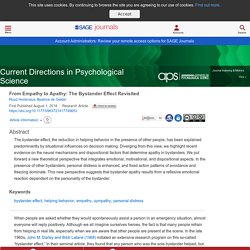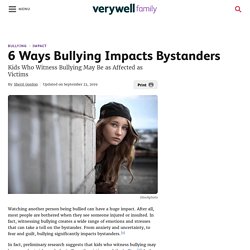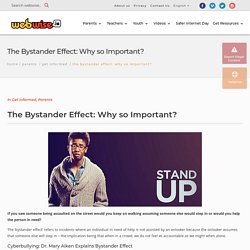

Another reason for the bystander effect has been termed pluralistic ignorance which is the tendency for people to look to others to understand if an emergency really exists. Bystander Effect - Definition, Examples and Experiment. Bystander Effect Definition The bystander effect, also called bystander apathy, is a term in psychology that refers to the tendency of people to take no action in an emergency situation when there are others present. This phenomenon is highly studied in the field of sociology. Bystander Effect Explained Psychologically, there are many causes of the bystander effect.
They range from thinking someone else is in charge, to not understanding the gravity of a situation because there are other people not taking action. How The Murder Of Kitty Genovese Created The Bystander Effect. Wikimedia CommonsKitty Genovese whose muder would inspire the psychological phenomenon known as the bystander effect.

At approximately 3:15 a.m. on March 13, 1964, a woman was murdered. Her name was Kitty Genovese. She was 28 years old, “self-assured beyond her years,” and had a “sunny disposition.” However, on that Friday evening, none of that mattered. As Kitty Genovese was stabbed to death in an alleyway outside her home, the friends and neighbors she had lived next to for several years stood by, choosing not to get involved as she lay there dying. Around 2:30 a.m. on the night of her attack, Kitty Genovese left the bar she worked at and headed for home. A few minutes after she left, she stopped at a traffic light. At 3:15, Genovese pulled into the parking lot of the Kew Gardens Long Island Rail Road station parking lot, which was about 100 feet from her front door.
Getty ImagesKitty at work at Ev’s bar. Upon being stabbed, Genovese screamed, running toward her home. Why we still look away: Kitty Genovese, James Bulger and the bystander effect. More than half a century later, the death of Kitty Genovese continues to remind us of the disconnect between what we believe about ourselves and how we really act under pressure.

The murder of the 28-year-old outside her apartment in the Queens neighborhood of Kew Gardens in the early morning of 13 March 1964 rippled through New York City and around the world. How could a young, independent woman who lived on her own terms be so easily struck down? How could so many neighbors look on and turn away as she was stabbed repeatedly on the street and in her apartment building? What did that collective inability to act reveal about ourselves, our communities, and our belief systems?
Genovese’s killer, Winston Moseley, died in prison this week, bringing the case and its implications back into the spotlight. Two weeks after her murder, Rosenthal assigned a story with the damning headline: “Thirty-Seven Who Saw Murder Didn’t Call Police.” Take the story of Hugo Alfredo Tale-Yax. Diffusion of Responsibility and Bystander Effect. Understanding Pluralistic Ignorance in Social Psychology - Psychologenie. Pluralistic Ignorance. Bystander Revolution: Dr. Philip Zimbardo.
The Science of Empathy. The Bystander Effect. From Empathy to Apathy: The Bystander Effect Revisited - Ruud Hortensius, Beatrice de Gelder, 2018. When people are asked whether they would spontaneously assist a person in an emergency situation, almost everyone will reply positively.

Although we all imagine ourselves heroes, the fact is that many people refrain from helping in real life, especially when we are aware that other people are present at the scene. In the late 1960s, John M. Darley and Bibb Latané (1968) initiated an extensive research program on this so-called “bystander effect.” In their seminal article, they found that any person who was the sole bystander helped, but only 62% of the participants intervened when they were part of a larger group of five bystanders. Following these first findings, many researchers consistently observed a reduction in helping behavior in the presence of others (Fischer et al., 2011; Latané & Nida, 1981).
Neural Mechanisms of Bystander Apathy Can neuroimaging studies inform the investigation of the bystander effect? Fig. 1. Dispositional Influences on Bystander Apathy Fig. 2. Preston, S. 6 Ways Bullying Impacts Bystanders. Watching another person being bullied can have a huge impact.

After all, most people are bothered when they see someone injured or insulted. In fact, witnessing bullying creates a wide range of emotions and stresses that can take a toll on the bystander. From anxiety and uncertainty, to fear and guilt, bullying significantly impacts bystanders.1 In fact, preliminary research suggests that kids who witness bullying may be as much at risk psychologically as the victims and the bullies.2 And much like victims of bullying, their physical health, mental health, and even academics can be affected. Here are six ways bystanders are impacted by bullying. The Bystander Effect: Why it matters for beating cyberbullying.
If you saw someone being assaulted on the street would you keep on walking assuming someone else would step in or would you help the person in need?

The ‘bystander effect’ refers to incidents where an individual in need of help is not assisted by an onlooker because the onlooker assumes that someone else will step in – the implication being that when in a crowd, we do not feel as accountable as we might when alone. Cyberbullying: Dr. 5 Effective Tips to Overcome the Bystander Effect. Overcoming the Bystander Effect.
How to Break the Bystander Effect. They could have left it to someone else. An Army veteran blocked a shooter in Oregon from entering his classroom. Three friends on a high-speed train from Paris to Amsterdam helped stop a gunman wielding an AK-47. This past spring, an Army captain in North Carolina pulled a couple to safety after a fiery car crash.
Were these men instinctively courageous, or had they learned to be? The Army captain (aptly wearing a Captain America T-shirt) credited his military training for knowing what to do and remaining calm. These heroes are dramatic examples. And this conundrum is not limited to thwarting terrorism or physically saving someone. Helping Kids Overcome the Bystander Effect.
Newscasters love to share stories of kids as young as three years old calling 911 to save a parent’s life.

These stories bear out what research has shown us: Very young children have a propensity to be kind and helpful. Starting as early as 18 months, studies show, toddlers spontaneously help an adult who is unable to pick up something he dropped or finds himself in a similarly tricky situation. Being kind at a cost to themselves makes two year olds happy, and three year olds who cooperate on a task share rewards even when they don’t have to. Overcoming the Bystander Effect. Have you ever been a hero? Going about our daily routines, few of us have the opportunity to save a life or disrupt a crime in progress—fewer still take that opportunity when it presents itself. I once witnessed a car accident in which the guilty party leapt from his disabled vehicle and fled the scene. I quickly pulled over and dialed 911. Fortunately, another passerby stopped and apprehended the suspect. The culprit—who was clearly intoxicated—struggled to escape, but he was easily overpowered.
Not only are acts of heroism unsurprisingly rare, reports about observers who, out of indifference or perplexity, fail to report criminal behavior or respond to emergencies with inaction are common. What is the Bystander Effect and How Can We Overcome it? - DefibsPlus. PSY108 TMA01 - Bystander Effect.